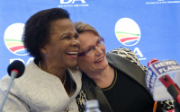
UNITY may be a strength for some people sometimes — but not for opposition parties in our electoral system. One of the great myths of politics in South Africa is that unity among opposition parties makes life more difficult for the African National Congress (ANC).
One lesson of the Democratic Alliance (DA)-Agang SA soap opera is that this simply is not so. When opposition parties merge, the effect is not to weaken the ANC, but to reduce the choices of opposition voters.
The obvious reason for opposition parties to work together would be that not doing so would split the vote, strengthening the ruling party. This can happen in systems where voters elect representatives in constituencies. If the governing party wins 40% in a seat and the rest of the vote is shared among other parties, it will win, even though most voters do not want it. But if there is only one opposition candidate, it will lose the seat. Unity is not meant to increase the vote of opposition parties but to make sure that their votes count.
There is virtually no chance of splitting the vote in our national and provincial elections because we use a strictly proportional representation system in which only a quarter of 1% of the votes wins a seat. Its purpose is to ensure that parties gain a voice in strict proportion to their vote and so opposition votes are rarely lost. Mergers between parties do not add to the opposition vote and so there is no incentive to agree not to compete.
The one exception is local government, where half the councillors are elected in a ward system in which votes can be split. But right now that is much less important than it seems. For reasons that can be explained another day, there is little competition in most wards: a particular party dominates and its opponents cannot win the ward even if they pool their votes. In the future, opposition pacts in local elections might make sense — now they have little value.
Uniting parties can only reduce the opposition vote because it narrows the choices of opposition voters. Under current conditions, these voters have many options, from the Freedom Front Plus through to socialist parties. Whichever of these parties they support, each vote counts to the opposition and so voters with different views can strengthen the opposition vote. Once parties start merging, voters may find there is no opposition party they can support. As a result, many stay at home, weakening the opposition vote.
That this is not an academic argument became clear in the past few days. Many Agang SA supporters reacted to the news that Mamphela Ramphele was to become the DA’s presidential candidate not by hailing a gain for opposition unity but by complaining that their choice had gone. Some were explicit — they would not vote for the DA and so they began looking for another party. They would have been able to find one they could support only because the opposition is not united. So only disunity would have kept them in the opposition camp.
There is one case in which unity does help the opposition. This is in Parliament, when the governing party needs a two-thirds majority (usually to change the constitution). The ANC is just short of a two-thirds majority and, if it wants one, it needs to find opposition support. If all opposition parties unite, it will fail. Realistically, given the divides between opposition parties, this can happen only when what the ANC wants will harm all opposition parties on specific policy issues. The party will always find some in the opposition who support what it plans to do.
We have seen total opposition unity on basic freedoms and may see it in future. But this sort of unity does not take choices away from voters and so will not cost support.
Given all of this, why do opposition parties become excited by unity? For the largest opposition party, the answer is clearly that it gains. For the smaller parties, it may be that they are still stuck in the old system in which, because constituencies were used, there was talk of the need for opposition unity. More realistically, politicians in smaller opposition parties may hope that hooking up with the DA will win them a role in the provincial government and municipalities it controls. That may make excellent sense for the politicians, but offers voters no benefit.
Over the past couple of elections, there has been a drift by opposition voters towards the DA. But while this has weakened other opposition parties, as long as our electoral system remains the same, a two-party system in which virtually the entire opposition unites will remain elusive. If parties need only a fraction of the vote, there will be good reason for them to resist being swallowed by a bigger party. And, because not all opposition voters want the same party, smaller parties will always win enough votes to continue.
A host of parties all catering for different voters is an opposition strength. Opposition strategies will be most effective if they recognise that.
By Professor Steven Friedman
Source: Business Day
Mamphela Ramphele, left, and Helen Zille at a press briefing in Cape Town last month, where it was announced Ramphele accepted an invitation to be the DA’s presidential candidate in this year’s national election. Picture: TREVOR SAMSON
Friedman is director of the Centre for the Study of Democracy.
